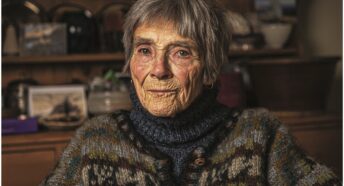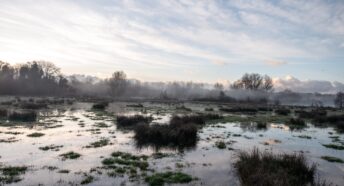A city champion steps aside

He’s been a leading light of Canterbury CPRE for a decade and he’s as enthusiastic for the cause as ever, but Barrie Gore has decided it’s time to vacate the chairman’s seat
The year, 1966. England won the World Cup. Barrie Gore moved to Kent…
Whether you regard the two events as of similarly momentous significance depends perhaps on personal perspective, but the decision of the former chairman of Canterbury CPRE to up sticks from the capital was, it is fair to say, not without impact.
The word ‘former’ is the one that catches your eye as Barrie has become almost a fixture in the cathedral-city role over the previous 10 years or so (“I haven’t counted them”).
“I’ve had enough,” he says. “I shall continue to support CPRE Kent – I’m as enthusiastic as ever – but although I’m in good health a few issues are starting to take their toll.”
He finally called it a day at the beginning of April after what was in fact two stints, having manfully stepped back into the breach after the death of Alan Holmes in 2017.
The initial engagement followed a spell helping out the Canterbury committee with CPRE’s Night Blight campaign.
That took him to London, where he was “impressed” by the organisation.
“Even so, I didn’t particularly volunteer for the Canterbury job,” he says. “But the chair, Katrina Brown, a farmer’s wife who was very good on agriculture, was pregnant and had other priorities! Against my better judgment, I was persuaded to take on the job.”
We need to campaign more
The last remark was (thankfully) said with a smile and it is apparent that Barrie’s respect for the organisation runs deep, even if he believes it might change a little the way it goes about things.
“I think CPRE is a wonderful organisation,” he says. “But we need to campaign more and run demonstrations. I wanted to have a funeral march down New Dover Road – at the head would be a coffin containing the soul of Canterbury.
“Surely CPRE did campaign in the early days, for example for the creation of National Parks? We do in a way now, by writing to the press and commenting on planning, policies and Local Plans, but we could sometimes be more demonstrative.”
The love of Canterbury is something else that shines bright, but he is of course not a genuine local. Rather, the cathedral city is Barrie’s adopted home.
“I was born a cockney, the genuine article, but moved to Rainham in 1966 and Canterbury in 1973.”
A solicitor, he ran “a small family practice” in Boughton that he eventually sold after starting up in Canterbury. “I had some wonderful staff working with me,” he says.
With wife Valerie, he has five grown-up children (Jonathan, Felicity, Elaine, David and Sophie) and “lots of grandchildren”, and it is perhaps the fact that east Kent has provided the home for his loved ones that has helped fire his passion for the area.
It is a passion, though, that is tinged grey with regret at many of the changes that have occurred during his time there, as well as obvious frustration.
“I have a theory – Kent has traditionally always been the point of invasion, and people have become conditioned to being steamrollered over. Kent people don’t jump up and down – if the things that have happened to Canterbury had happened to London, there would have been an uproar.
“I think people across the county have lost faith in having their views entertained and acted upon. Now it’s all about going to court and it shouldn’t be like that – you now have to be a wealthy person to be able to challenge decisions you might not like. That was not always the case.”
The shift in the planning environment, perceived or otherwise, is not of course restricted to Canterbury, but it is nevertheless enlightening to hear the views of someone who has spent years on the campaign frontline largely in one particular place. What has been the greatest change during his tenure?
“The main difference is the individual feeling that whatever people say they can’t make a difference – that’s the greatest sadness.
“The consultation process, so lionised by government, brings in people far too late as, in reality, the actual decision has often already been made. We’ve seen problems with our draft Local Plan, which in my view, and that of many others, didn’t accurately summarise comments from the public – the process was geared in a way that indicated it had more support than it actually did.
“Democracy has on the face of it stepped backwards, despite us theoretically being told more. People are shovelled away. Having only three minutes to speak before the planning committee on a major application is a case in point.
“A classic example in Canterbury is at Wincheap, where the city council wants to build a car park right up to the River Stour, ruining a historic setting and adversely affecting the adjoining countryside. That car park could be put anywhere on Wincheap with a far less destructive outcome.
“Another is the way the local authority follows the government line on housing, whereas it should be saying publicly: ‘Sorry, Canterbury can’t cope with this sort of thing’. I have asked the council to do this, but they have not done so – nor have they told us what they discuss on their visits to central government.”
More broadly, Barrie is clear where the blame lies for what he sees as a fading democracy: “The local government reorganisation in 1974 – I knew it was a bad thing as soon as it happened. Things weren’t overtly political before, but now it’s all black and white, wholly polarised.
“It’s a terrible situation here – Canterbury is losing a lot of its character and the status of its World Heritage Site could be lost. There is a management plan, but it isn’t being monitored, which it should be at least twice a year. The WHS management committee was apparently without a chair for a period and has not met as often as it should in recent years.
“We, and others, have written letters to UNESCO [United Nations Educational, Scientific and Cultural Organization] about the dangers to the WHS – I don’t like the idea, but we’ve tried everything else.”
Has the onslaught ever been so bad?
“Not since I’ve lived in Canterbury, anyway.”
What is to be done?
“I ask myself the same question. I don’t know.
“There should be pressure on central government to bring back the central grant system. Canterbury is a small district with a lot of heritage liabilities, such as the city wall and many other lovely buildings.
“I think they’re failing to protect the assets they have and are spending money on new projects when they are perhaps financially unable to protect and look after them as well. They wanted to ‘improve’ St George’s Place at a cost of £80,000 and have spent more than £10 million on a shopping precinct that has no local businesses and appears focused solely on attracting large companies from outside.
“Another theoretical consultation – they pulled down a perfectly good cinema [the building that became The Marlowe Theatre] at considerable expense for a replacement that does not cater as well as it should for the needs of the disabled and has an unfortunate effect on the conservation area and its historic buildings.
“As for its design and the illumination, whoever thought of having Piccadilly Circus in front of the cathedral?”
Alternative ways forward
The disenchantment of Barrie Gore with much of what he sees around him cannot be denied and he is not, it is fair to say, enamoured with the condition of local democracy, at least in this part of the world.
There is a train of thought that says we should highlight only the positive, avoiding any hint of naysaying, but if that is not a true reflection of matters then aren’t we in danger of entering the realms of, at best, complacency or, at worst, dishonesty? Either way, we do need to be able to offer alternative ways forward. Over to Barrie…
“I’ve often thought amenity bodies should have a voting place on planning authorities.
“The most disappointing thing is all these protective amenity organisations only have advisory status – they have no statutory teeth, so councils can ignore them.
“Organisations such as ours have far more rural experience than many of the councillors elected to represent rural communities.”
It would be wrong to give an impression of Barrie the doom-monger. Rather, he is a jolly fellow who rejoices in the finer things in life, notably, in our context, the scuffed gem of Canterbury, while he is warm in his praise of those he thinks deserving of it.
“I think CPRE national office does a really good job with some wonderful and very sincere people. It is short-staffed, which is a shame and means they can’t perhaps deal with all the nitty-gritty in detail – the NPPF was a wonderful example of that.”
It is no secret that CPRE is looking to move with the times in a way it has arguably not done before, a process with which Barrie is fully on board.
“We should be getting more out of our members – and getting more members. We need to hit people at the inquiry stage: ‘Right, you’ve seen our mettle – cough up!’.
“Let’s get into primary schools and talk about heritage and countryside – children are very responsive and would take leaflets home to their parents. We have to put idealism to one side, and sometimes the economy too, and get on with protecting what’s important.
“Our role is to defend and protect the countryside, but we should include heritage in that objective. We’ve done a lot of work here and I should say that the Canterbury Society was also very good in that department.
“The problem is, people don’t know what we stand for. We do so much good – if it wasn’t for us, groups like the RSPB wouldn’t have the land to protect.”
The positivity horse is now in full gallop, so, in wishing Barrie the very best in his retirement from the Canterbury CPRE chair and thanking him for his efforts, let’s ride it to the end…
“We’ve raised the profile of CPRE here – our Canterbury committee has a wealth of experience and knowledge, and has been very supportive to me personally and to the aims of CPRE Kent. As a result, I believe we have the respect of the council. I do think we have made a difference.”
Wednesday, May 8, 2019
- A number of important documents have yet to emerge. For example, a rigorous transport plan and a finalised air-quality assessment. The latter is critical given that allocations at Teynham will feed extra traffic into AQMAs.
- There seems to be no coherent plan for infrastructure delivery – a key component of the plan given the allocations being proposed near the already crowded Junction 7.
- There seems to have been little or no cooperation with neighbouring boroughs or even parish councils within Swale itself.
The removal of a second consultation might have been understandable if this final version of the plan were similar to that being talked about at the beginning of the consultation process. It is, however, radically different in the following ways:
- There has been a major shift in the balance of housing allocations, away from the west of the borough over to the east, especially around the historic town of Faversham. This is a move that raises many concerns.
- A new large allocation, with accompanying A2 bypass, has appeared around Teynham and Lynsted, to which we are objecting.
- Housing allocations in the AONB around Neames Forstal that were judged “unsuitable” by the council’s own officers have now appeared as part of the housing numbers.
- Most of the housing allocations being proposed are on greenfield sites, many of them on Grade 1 agricultural land – a point to which we are strongly objecting.
Concerns about the rush to submit the plan
The haste with which the plan is being prepared is especially worrying given the concentration of housing in Faversham. If the town is to take a large amount of new housing, it is imperative that the policies concerning the area are carefully worked out to preserve, as far as possible, the unique nature of the town. The rush to submit the plan is likely to prove detrimental.
As Swale does not have a five-year land housing supply, it is open to speculative development proposals, many of which would run counter to the ideas contained in the current plan. Some are already appearing. This is a common situation, and one that, doubtless, is a reason behind Swale’s haste.
Our overriding fear, however, is that this emphasis on haste is ultimately going to prove counterproductive. This is because it is our view that the plan, in its current form, is unlikely to pass independent examination. We are urging Swale to listen to and act upon the comments being made about the plan and to return the plan to the council with appropriate modifications before submitting it to the Secretary of State.
Essentially, this means treating the current consultation not as the final one but as the ‘lost’ second consultation.
The consultation ends on Friday 30 April and we strongly urge residents to make their opinions known if they have not already done so.
Further information








